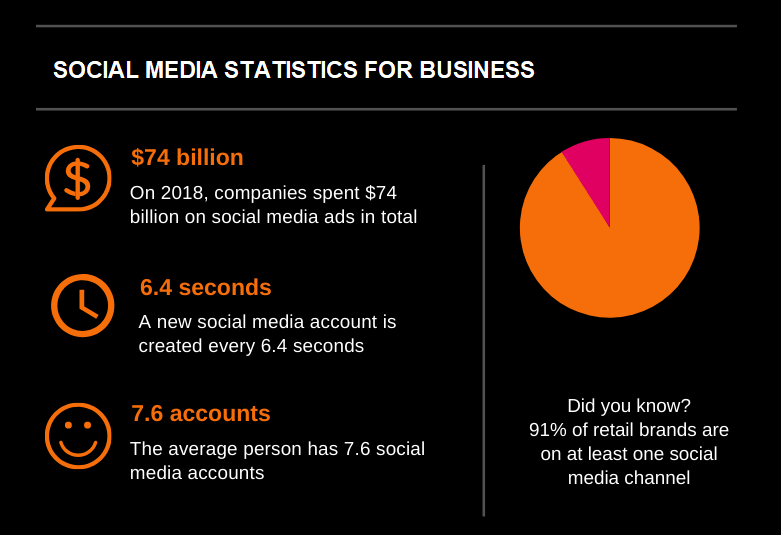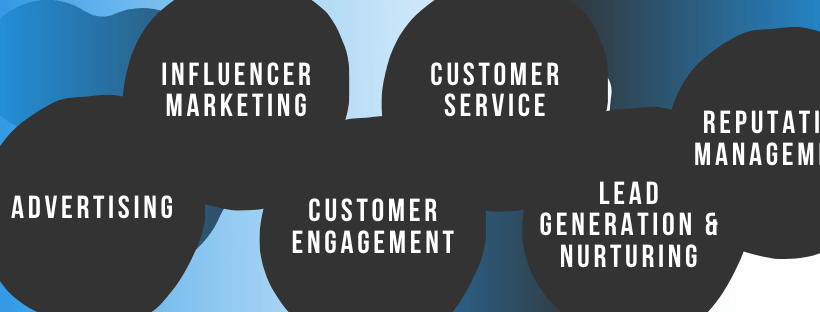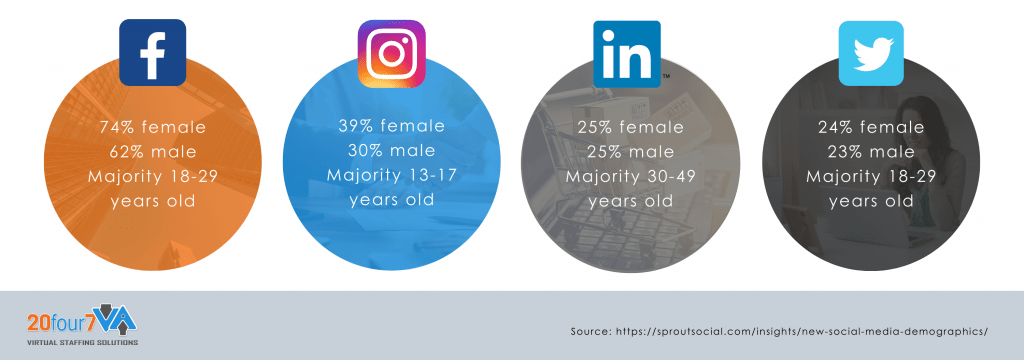10 Social Media Tips for Small Businesses

Did you know that out of the 7.7 billion people in the world, 3.499 billion are active social media users? That’s more than 45% of the world’s population! Since social media marketing boomed in the past few years, people have collected many interesting statistics that prove just how big the impact of this relatively young marketing and advertising platform is, and it’s not surprising to see just how many entrepreneurs are looking more closely into social media marketing tips for small business.
Check out these key statistics about social media from Brandwatch:
- People have 7.6 social media accounts on average
- A new social media account is created every 6.4 seconds
- Social media content is the top content marketing tactic at 83% (blogs are 80% and email newsletters are 77%)
- Ad spending on social media reached $74 billion in 2018
- 91% of retail brands are on at least one social media channel
- 81% of small to medium sized businesses use some form of social media
All these show how deeply embedded social media has become in people’s daily lives. And it’s only poised to grow even more. Currently, the biggest social media channels are Facebook and Instagram, with 2.375 billion and 1 billion users respectively. And there are dozens of other social media platforms whose users are growing steadily in number. As a business owner, failure to take advantage of this it would be a major oversight.

For small to medium businesses (SMBs), social media also helps level out the playing field. Since social media marketing is very cost-effective, startups and SMBs can use it almost to the same degree of effectiveness as Fortune 500 companies. There are also a practically limitless supply of online resources that will provide you with social media marketing ideas for small business that have been proven effective already. This means that you’ll have plenty of small business social media marketing tips and ideas to help you get started.
If you’re a small business owner looking for a way to market your way to success in such a competitive industry, social media is definitely the way to do it.
The role of social media in business
Contrary to what most people believe, social media for business isn’t just about marketing a company or brand. Social media can also help with facilitating sales, improving brand reputation, and providing better customer service.
Here’s how businesses of all sizes can benefit from following some social media management tips.

- Advertising
This one is pretty straightforward. Facebook, Instagram, and Youtube already have integrated advertising platforms within their networks, and other social media channels are bound to follow.
With the sheer volume of users on any given social platform and the level of engagement these users exhibit, advertising on social media is definitely a must.
- Influencer marketing
Social media paved the way for a new type of marketing: influencer marketing. Now, you don’t need to pay thousands of dollars for celebrities to endorse you. You can just check out local influencers in your niche and form a mutually beneficial partnership with them at a lower cost to you.
- Customer engagement
Social media has made it easier for brands to hear from their customers and show them that they actually care about what consumers think. Replying to customer suggestions and feedback is an excellent way to keep customers interested in your brand and products/services.
- Customer service
Social media platforms usually have integrated private messaging features too. Direct messages on Instagram, Twitter, and Facebook Messenger has allowed brands to resolve customer concerns more efficiently.
- Reputation management
Social media has allowed brands to clear up misconceptions and response to negative feedback about them a lot more quickly compared to when they had to formally issue press releases on print or arrange press conferences. For small businesses who barely have the budget or opportunity for more formal statements on the media, this is definitely a welcome development.
- Lead generation and nurturing
By looking at who people followed or what they liked on social media, companies are able to reach out to new leads and give their brands more exposure. Corresponding with them on social media through posts, replies, and messages also made it easier to nurture these leads and convert them into actual paying customers.
10 social media tips for small business owners
Now that you know just how important social media is for business, it’s time to learn about the 10 essential social media marketing tips for small business that every entrepreneur needs to know.
- Know your audience.
Identifying and knowing your target market by heart is essential in social media marketing. It helps you formulate a strategy that will work well with your audience’s habits and interests, and it will help you know what type of content will really resonate with them.
Knowing your audience will help you improve the targeting of your social media ads. With better targeting, you can raise the ROI of your ads and get more bang for your buck. - Choose one or two platforms to focus on.
It’s tempting to maintain several social media channels to ensure that you’ve covered all your bases. However, trying to maintain so many pages can be very exhausting. Besides, not all of these social channels will give you the same value.
When creating your social channels, choose quality over quantity. Maintaining a truly engaging page on just or two platforms is much better than having an account on 10 different social channels and barely posting any content on each of these accounts. To help you pick the best platform for your business, here are some key audience data for some of the top social media platforms:
- Create a social media calendar and schedule your posts.
Creating a social media calendar and scheduling your posts in advance not only helps you organize your social media feeds, they also leave you more time to engage with your audience.
Having a social media calendar also helps you keep up with trends and ensure that your content is timely and not repetitive. - Look at what your competitors are doing.
It’s always important to check out your competitors social media pages and learn from them. Your most successful competitors must be doing something right if they are getting a lot of likes, follows, and comments right?
When scoping out the competition, make sure to keep an open mind. Learn from both their mistakes and accomplishments. Take inspiration from them but never copy them. Copying competitors rarely, if ever, yields the same results for the one who copied. It also makes them look pitiful in case someone notices that they’re copying someone else.
- Follow and engage with customers, brands, and influencers.
Posting content regularly isn’t enough to maintain a great social media channel. Engagement is important too. Follow back influencers, brands, and maybe some customers who followed you and engage with their channels as well. Like their comments on your posts and comment on their posts too. This makes your brand more likeable and relatable, and encourages your audience to keep interacting with you. - Tailor your content to the platform.
Some social media platforms are better suited for specific types of content. Short-form announcements and clever quips are great for Twitter, stunning images are perfect for Instagram and Tumblr, while general posts enhanced with photos and videos work well for Facebook.
When creating content for social media, make sure to consider which platform it’s going to be posted on. You don’t need to create unique content every time, but it’s useful to alter the presentation of your content to make it better suited to the platform. - Use the right tools to maximize efficiency.
There are many tools out there that can help you improve efficiency when it comes to social media management. Take the time to test out different tools in order to find out which ones can really improve your process. - Monitor brand mentions, comments, and relevant tags.
Have you heard of social listening? Social listening pertains to the monitoring of conversations about your brand on social media.
To do social listening, always check for mentions, tags, and comments related to your brand. Monitoring these can help you find new leads, manage your reputation, and get new ideas for your products and services. Also, take the time to respond to relevant comments and posts. - Use compelling visuals as much as possible.
No matter what platform you’ve chosen to focus on, great imagery will always yield better engagement. Create beautiful graphics and videos to go along with your posts to generate interest and improve engagement. - Optimize, track, and test.
Like any digital marketing strategy, tracking and analytics are important in social media as well. Data analytics and A/B testing will help you measure the success of your strategies and optimize your campaigns for better results.
One last thing to remember about social media: it evolves rapidly. What could be considered the best social media tips for 2019 might be considered obsolete in 2021. Make sure that you regularly brush up on the best social media marketing tips to ensure that your strategy will yield the best results.
Although it’s important to learn about social media as a business owner, you will still definitely need some help when it comes to implementing your strategy. However, hiring an in-house social media specialist or outsourcing to a social media marketing firm can be expensive.
For small business owners who need a hand with social media management, hiring a social media virtual assistant is the way to go. Here’s what a social media VA can help you with.











